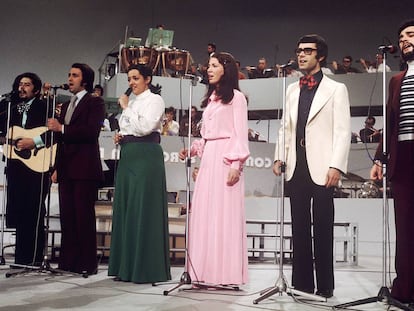Vicente Fernández, the last king of mariachi, dies at 81
The award-winning Mexican singer has died due to a respiratory problem, leaving behind a 50-year legacy and a few unanswered questions
“But the day that I die, I know you’ll have to cry; cry and cry.” Vicente Fernández, one of the most influential of Mexico’s ranchero singers, has sung this line from the song El Rey (or, The King), hundreds of times. On Sunday, at the age of 81, the seminal voice of Mexican mariachi music – one of the greatest in the history of the genre, alongside Pedro Infante, Jorge Negrete and Javier Solís – passed away. For his millions of fans in Latin America, the mournful moment to cry for the king had arrived.
Fernández had been under medical care since August. That month, his family confirmed through the singer’s official Instagram account that he was in a serious condition following a fall at his ranch “that caused a spinal cord trauma at the cervical spine level.” The medical team that operated on Fernández kept his fans up to date regarding his health – he was placed on ventilatory support and required a tube to be fed – over the following weeks via social media. After several days of observation in a Guadalajara hospital, Fernández was discharged and able to return home. But last Friday one of his sons and a doctor told the Mexican newspaper Reforma that the singer had been admitted to hospital again in critical condition with pneumonia. Fernández passed away after his respiratory condition worsened, his family confirmed.
Fernández – or “Chente” as he was popularly known – was born in the village of Huentitán El Alto, Jalisco, in 1940, the son of a rancher and a home-maker, and started out in the world of music by singing at weddings and restaurants in Guadalajara and later in Mexico City. He appeared on television shows and managed to get some of his songs played on radio stations in the capital, leading to CBS (now Sony Music) opening its doors to him in 1965. Some of his songs – Tu camino y el mío ( or, Your road and mine), Perdóname ( or, Forgive me), and his album Palabra de rey (or, The king’s word) – gained popularity but his big break came a decade later with the song that catapulted him to stardom, in 1972: Volver, volver ( or, Going back, going back).
“Into your arms, again, I will get to where you are; I know how to lose, I know how to lose, I want to go back, go back, go back,” runs the chorus of Volver, volver, a tragic love song that turned Fernández into the king of mariachi across the whole of Latin America. The song was covered by a vast array of musicians, from Chavela Vargas, Concha Buika and Ana Gabriel, to Nana Mouskouri and Harry Dean Stanton. But there is no rendition of the song as memorable as the one Fernández and his son, the singer Alejandro Fernández, performed together at a concert several years ago. “I believe that on the day they are burying me, the whole world will sing it,” Fernández told the audience of his most beloved song.
Chente’s career spanned more than half a century, he sold more than 50 million records worldwide (almost always produced by Sony Music) and left a sprawling legacy “about tears and sighing, of abandonment and painful memories; his music laughs while the singer laments,” as noted in a New York Times review of a 2008 show at Madison Square Garden.
As well as his musical success, Fernández also made appearances in dozens of films and television soaps. He won three Grammy Awards and nine Latin Grammy Awards during his career and he has a star on the Hollywood Walk of Fame. “We are honored by the visit of the titan of the most profound of our peoples, not just of the Mexican people but of all the peoples of America and the world,” said then Venezuelan president Hugo Chávez in 2012 when bestowing the Order of the Liberators of Venezuela, the country’s highest honor, on Fernández.
“Solís, Infante or Negrete did not have the fortune to confront the laws of time. Vicente overcame them and there is nobody that can replace him”, the songwriter Martín Urieta, who created 25 songs for Chente, told El PAÍS last year. “His voice is intact at the age of 80 and we’ll never know if Infante, for example, would still be the same at the same age. This is one of Vicente’s great merits; he will always remain as number one.” Urieta is one of a group of composers who found what they were looking for in Fernández’s voice, along with Federico Méndez Tejada, Fernando Maldonado (who wrote Volver, Volver), José Alfredo Jiménez (who wrote El Rey), Gerardo Reyes and Jorge Massías.
Although he was famous for so many hits, Chente wrote very few songs himself. “I have never said I’m a songwriter,” he explained in an interview published on his official website. “It’s a very difficult job. However, some ideas and inspiration have come to me and when that happens, I rush to grab a pen and scribble down a few lines.”
Vicente Fernández performed live for the last time on April 16, 2016, at the age of 76, in a spectacular show at the Azteca Stadium in Mexico City in front of 90,000 fans. “The day that I run into [then US president] Donald Trump I’m going to spit in his face,” he said on the day of his farewell from public performances.
Chente, however, was far from an impeccable idol, and running concurrent to his legend are serious question marks. In later life, he was criticized for his alignment with Mexico’s Institutional Revolutionary Party (PRI), and he was widely condemned when he said in 2019 that he had refused a liver transplant because he did not want an organ that could have belonged to a “homosexual or a drug addict,” despite successful life-saving surgery to remove a tumor from his liver in 2012. “He couldn’t stand Juan Gabriel because he was gay; Chente was a man from another era and he was very homophobic,” the writer Olga Wornat recently told EL PAÍS about the relationship between the two singers. Wornat has just published El ultimo rey (or, The last king), an unauthorized biography that addresses the chauvinistic behavior of Fernández and the alleged links between his son, Gerardo Fernández, with the Sinaloa cartel.
“Did Chente know? Yes, he knew. But he turned a blind eye,” said Wornat of the criminal association of his son. “And then there is the case of the singer Joan Sebastián [who was accused of links to the cartels and human trafficking after his death in 2015], who was a close friend of Vicente Fernández. They used to visit each other at their ranches and Alejandro Fernández was like a godson to him. But he was not only the subject of a drug-trafficking investigation, there were also parties at his ranch with minors who had been kidnapped in Guatemala. And I ask myself: ‘How did Chente not know about this?’ Maybe he didn’t want to know or he didn’t want to look, I can’t be sure because he became ill and I never got the chance to ask him that question, and nobody else ever asked it.”
“Life is a glass of liquor; nobody enjoys it forever. It ends if you down it in one, the same as if you sip it slowly,” one of Chente’s songs says. A man who said he had no throne and no queen, and that there was nobody who understood him, drank the sweetness of life for 81 years. Now he has gone, with many serious questions left to answer. But he remains the king.
Tu suscripción se está usando en otro dispositivo
¿Quieres añadir otro usuario a tu suscripción?
Si continúas leyendo en este dispositivo, no se podrá leer en el otro.
FlechaTu suscripción se está usando en otro dispositivo y solo puedes acceder a EL PAÍS desde un dispositivo a la vez.
Si quieres compartir tu cuenta, cambia tu suscripción a la modalidad Premium, así podrás añadir otro usuario. Cada uno accederá con su propia cuenta de email, lo que os permitirá personalizar vuestra experiencia en EL PAÍS.
¿Tienes una suscripción de empresa? Accede aquí para contratar más cuentas.
En el caso de no saber quién está usando tu cuenta, te recomendamos cambiar tu contraseña aquí.
Si decides continuar compartiendo tu cuenta, este mensaje se mostrará en tu dispositivo y en el de la otra persona que está usando tu cuenta de forma indefinida, afectando a tu experiencia de lectura. Puedes consultar aquí los términos y condiciones de la suscripción digital.
More information
Archived In
Últimas noticias
Most viewed
- Alain Aspect, Nobel laureate in physics: ‘Einstein was so smart that he would have had to recognize quantum entanglement’
- Maps of the US attack on Venezuela: Targets, airspace and deployed fleet
- Oil, gold and rare earth elements: the backdrop to US political tension with Venezuela
- Key points of the military attack on Venezuela: Early morning bombings and a ‘captured’ president
- The US bombing of Venezuela, in pictures












































